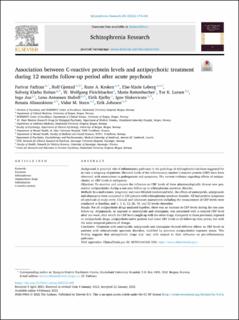| dc.contributor.author | Fathian, Farivar | |
| dc.contributor.author | Gjestad, Rolf | |
| dc.contributor.author | Kroken, Rune Andreas | |
| dc.contributor.author | Løberg, Else-Marie | |
| dc.contributor.author | Reitan, Solveig Merete Klæbo | |
| dc.contributor.author | Fleichhacker, W. Wolfgang | |
| dc.contributor.author | Rettenbacher, Maria | |
| dc.contributor.author | Larsen, Tor Ketil | |
| dc.contributor.author | Joa, Inge | |
| dc.contributor.author | Stabell, Lena Antonsen | |
| dc.contributor.author | Kjelby, Eirik | |
| dc.contributor.author | Sinkevicute, Igne | |
| dc.contributor.author | Alisauskiene, Renata | |
| dc.contributor.author | Steen, Vidar Martin | |
| dc.contributor.author | Johnsen, Erik | |
| dc.date.accessioned | 2022-06-15T11:45:19Z | |
| dc.date.available | 2022-06-15T11:45:19Z | |
| dc.date.created | 2022-04-27T13:11:26Z | |
| dc.date.issued | 2022 | |
| dc.identifier.issn | 0920-9964 | |
| dc.identifier.uri | https://hdl.handle.net/11250/2998873 | |
| dc.description.abstract | Background
A potential role of inflammatory pathways in the pathology of schizophrenia has been suggested for at least a subgroup of patients. Elevated levels of the inflammatory marker C-reactive protein (CRP) have been observed, with associations to pathogenesis and symptoms. The current evidence regarding effects of antipsychotics on CRP levels is ambiguous.
Objectives
To examine and compare the influence on CRP levels of three pharmacologically diverse new generation antipsychotics during a one-year follow-up in schizophrenia spectrum disorder.
Methods
In a multicenter, pragmatic and rater-blinded randomized trial, the effects of amisulpride, aripiprazole and olanzapine were compared in 128 patients with schizophrenia spectrum disorder. All had positive symptoms of psychosis at study entry. Clinical and laboratory assessments including the measurement of CRP levels were conducted at baseline, and 1, 3, 6, 12, 26, 39, and 52 weeks thereafter.
Results
For all antipsychotic drugs analysed together, there was an increase in CRP levels during the one-year follow-up. Aripiprazole, as opposed to amisulpride and olanzapine, was associated with a reduced CRP level after one week, after which the CRP level caught up with the other drugs. Compared to those previously exposed to antipsychotic drugs, antipsychotic-naïve patients had lower CRP levels at all follow-up time points, but with the same temporal patterns of change.
Conclusion
Treatment with amisulpride, aripiprazole and olanzapine showed different effects on CRP levels in patients with schizophrenia spectrum disorders, modified by previous antipsychotics exposure status. This finding suggests that antipsychotic drugs may vary with respect to their influence on pro-inflammatory pathways. | en_US |
| dc.language.iso | eng | en_US |
| dc.publisher | Elsevier | en_US |
| dc.rights | Navngivelse 4.0 Internasjonal | * |
| dc.rights.uri | http://creativecommons.org/licenses/by/4.0/deed.no | * |
| dc.title | Association between C-reactive protein levels and antipsychotic treatment during 12 months follow-up period after acute psychosis | en_US |
| dc.type | Journal article | en_US |
| dc.type | Peer reviewed | en_US |
| dc.description.version | publishedVersion | en_US |
| dc.rights.holder | Copyright 2022 The Authors | en_US |
| cristin.ispublished | true | |
| cristin.fulltext | original | |
| cristin.qualitycode | 2 | |
| dc.identifier.doi | 10.1016/j.schres.2022.01.049 | |
| dc.identifier.cristin | 2019520 | |
| dc.source.journal | Schizophrenia Research | en_US |
| dc.source.pagenumber | 174-183 | en_US |
| dc.identifier.citation | Schizophrenia Research. 2022, 241, 174-183. | en_US |
| dc.source.volume | 241 | en_US |

